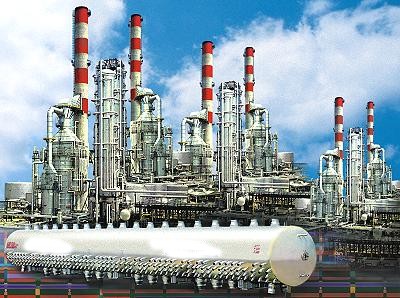 Many industrial facilities—particularly oil refineries and petrochemical plants located near the ocean or a sea, or in areas where it rains a lot—suffer from both CUI and energy waste when insulation becomes damaged. When insulation systems age or become damaged, the caulk sealant cracks and the metal jacketing can open up gaps where rainwater—which may contain salt—intrudes.
Many industrial facilities—particularly oil refineries and petrochemical plants located near the ocean or a sea, or in areas where it rains a lot—suffer from both CUI and energy waste when insulation becomes damaged. When insulation systems age or become damaged, the caulk sealant cracks and the metal jacketing can open up gaps where rainwater—which may contain salt—intrudes.
If the insulation is an absorbent type and the service temperature is relatively low (below 300°F), then CUI can result. The heat loss from wet insulation may be as much as 10 times that for dry insulation. This can be a constant battle at older facilities because the caulk used to seal metal jacketing embrittles with time, and the metal jacketing itself may get dented, opening gaps and admitting water.
To prioritize maintenance work at refineries, petrochemical plants, and chemical plants, owners typically perform a risk assessment of the piping and equipment. These assessments help prioritize the most important items from the perspective of plant operation and/or plant safety. This risk assessment can be used to identify those areas where insulation needs to be repaired or replaced sooner rather than later since problems, such as CUI, can result in a partial facility shutdown or, worse, in a pipe or equipment leak.
To mitigate CUI, many refinery owners apply immersion-grade coatings to all piping and equipment that operate continuously at temperatures below 300°F. Some owners also require the use of non-absorbing insulation materials for all service temperatures. While the practice of using non-absorbing insulation is not prevalent everywhere, it is becoming increasingly common at facilities.
With today’s high energy costs, which make up approximately half the operations and maintenance costs at a typical refinery, maintaining insulation is a matter of economics. However, damaged insulation does not usually stop a facility from running. Operators simply increase the heat input to maintain process temperatures as required. Many refineries have had to increase the heat input during and immediately after heavy rains to compensate for water absorbed into the insulation at their facilities. One oil company engineer notes that it can take at least 3 days to dry out absorbent insulation following heavy rains at the company’s refineries. So even for pipes and equipment operating at temperatures above 300°F, where CUI is less likely to occur, energy waste from wet insulation is always a concern with water-absorbing insulation.
Using non-absorbing insulation materials is one approach to preventing wet insulation and CUI. Another approach is to add a chemical inhibitor to the absorbent insulation during manufacturing. Such chemical inhibitors reduce the probability of corrosion by inhibiting the corrosive effects of chlorides from saltwater and other sources. Insulation with chemical corrosion inhibitors is available in the marketplace.
A new technology that helps avoid CUI when using absorbing insulation materials is self-adhering laminate jacketing—thick tape that comes in 36-inch widths to match the pipe insulation width. The jacketing can be effectively sealed to itself with overlaps along the lap joints and with a minimum of 4-inch-wide, self-adhering tape—of the same material as the jacketing—applied at butt joints, junctions, and penetrations. Self-adhering laminate jacketing requires minimal caulk sealants and is available in weather-resistant, chemical-resistant forms.
Since it uses only a thin-coated aluminum foil as opposed to aluminum sheet, laminate jacketing also uses much less aluminum, which has skyrocketed in price over the past few years. The laminate jacketing is flexible and dent-resistant. Since the adhesion of the material to itself is so tight, this new technology promises to be an effective way of keeping water from intruding into absorbent insulation materials on above-ambient applications.
Source:http://www.insulation.org/articles/article.cfm?id=IO070701




No comments:
Post a Comment